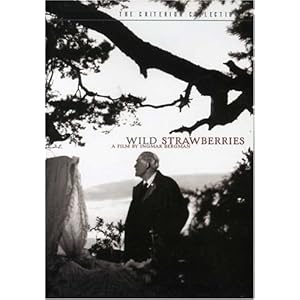
Ingmar Bergman's most famous film is The Seventh Seal, perhaps almost entirely because of the chess game with Death scenes. But he actually had another movie that was released the same year, and it turns out I actually preferred it. Wild Strawberries deals similarly with questions of mortality and (to a lesser extent) religion, although it is contemporary rather than set during the crusades. It's about an elderly doctor who is returning to his old university to receive an honorary degree. He decides at the last minute to drive to the ceremony, and the film is about his journey, through life as well as to Lund University. There are frequent dream sequences, sometimes mysterious and filled with strange imagery but more commonly just memories of things he did or didn't actually see, that show how events brought him to the depressing situation they're in now.
He hasn't had the most fulfilling life, a long-time widower with only his ancient mother and a single child following his same path of coldness and introversion as living relatives. He is accompanied on the car ride by his daughter-in-law and a few teenagers, one of whom reminds him of a girl he used to be in love with but who ended up marrying his brother (and is actually played by the same actress, which I failed to notice), and their influence along with his reflections cause him to reevaluate how he thinks about life over time. As I mentioned, the themes are often similar to those in Seal, but Strawberries worked better for me because it was more about showing things that lead the revelations than people talking about their beliefs. The two biggest characters from that movie also show up in small parts here, but Victor Sjöström does very well in the lead role to keep the audience's attention, in his final performance, and gives the movie a weight it couldn't survive without.
It seems like life and death were always things that Bergman was thinking about, and it's pretty remarkable what a grasp he seems to have on the truth about being old when he was just in his 30s. It's one thing to understand and appreciate a powerful story like this, but actually telling it so well is something else. The use of unique images is impressive without overpowering the message, and it's just a remarkable story that manages to cover really hard topics without getting too depressing, and actually managing to come around to uplifting by the end. It's a bittersweet movie, but that makes it all the more interesting and likely to stick with you after it ends.
AAAAAGGGHHHH
16 years ago


































No comments:
Post a Comment